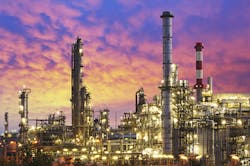Honeywell Technology Chosen for New Refinery in Iraq
A new refinery currently under construction in Iraq will run on process technology and advanced automation controls from Honeywell.
The technology and manufacturing group said on Monday that the refinery in Karbala Province will use refining processes from Honeywell UOP and automation controls from Honeywell Process Solutions to maximize production of fuel and other products.
The 140,000 barrel-per-day refinery is expected to start operating in 2020, helping to meet growing domestic demand for products that meet international standards equivalent to Euro V fuel standards.
Iraq currently imports more than 350,000 barrels per day of refined products.
“The integration of process technology with a controls solution enables the Karbala refinery to make more gasoline, diesel, fuel oil, jet fuel, liquefied petroleum gas and asphalt, and make it more efficiently,” said Mike Millard, vice president and general manager of Honeywell UOP’s Process Technology and Equipment business.
Iraq’s State Company of Oil Projects (SCOP) has licensed a wide range of Honeywell technologies for the Karbala refinery, including:
- The UOP Penex process to upgrade light naphtha feedstock to produce isomerate, a cleaner gasoline blend-stock that does not contain benzene, aromatics or olefins.
- The UOP fluid catalytic cracking (FCC) process to convert heavy feedstocks recovered from other refinery operations into high-octane gasoline.
- The UOP CCR Platforming process to convert low-quality naphtha to high-octane blending components for gasoline.
- The UOP Unionfining process to improve the quality of distillate boiling-range feedstocks to help meet tougher product specifications.
- The UOP Chlorsorb process to help meet stringent waste gas specifications.
- The Experion Process Knowledge System (PKS), the heart of the Integrated Control and Safety Systems (ICSS), enabling integration of all process control and safety systems and automation software under a single architecture.
- Safety Manager, which integrates process safety data, applications, system diagnostics and critical control strategies, and executes defined safety applications in a fully redundant architecture.
- Fire and gas safety systems and UniSim training simulators.
